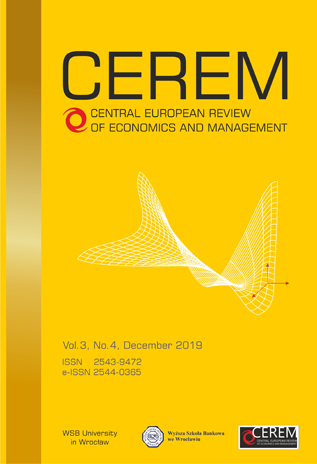Do mergers and acquisitions increase default risk? Evidence from the European market
DOI:
https://doi.org/10.29015/cerem.861Abstrakt
Aim: In this study, we examine the changes in default risk of the bidder over the course of a merger or acquisition. The data set consists of 531 deals in which the acquirers are European firms. We employ a general set of determinants to analyse the change in default risk and extend the literature by providing new empirical evidence for the European capital market.
Research design: Abnormal returns are analysed to provide preliminary insights into the merger induced valuation effects. All hypothesized relationships on the changes in default risk are tested via a regression analysis. We differentiate these results further by analysing which factors determine the increase in default risk.
Findings: Previous research on this issue reported mixed results. The main finding of our empirical analysis is that, on average, mergers and acquisitions of European bidders significantly increase default risk during the post-merger period.
Originality: This study adds to the mergers and acquisitions literature for European bidders and targets. The empirical findings suggest that some observed relationships and determinants are different in Europe than in the United States.
Implications: This research introduces a default risk model that could be applied to predict bidder performance subsequent to a merger or acquisition by analysing possible changes in default risk of the bidder. It also provides some possible explanations for the average increase in default risk. This study may help practitioners to better assess the potential risks when acquiring other firms.
Key words: mergers & acquisitions, abnormal returns, default risk, Europe
JEL Codes: G32, G34
Pobrania
Opublikowane
Numer
Dział
Licencja
Autor przenosi nieodpłatnie na Wyższą Szkołę Bankową we Wrocławiu , bez ograniczeń terytorialnych, majątkowe prawa autorskie do tego utworu w rozumieniu ustawy z dnia 4 lutego 1994 roku o prawie autorskim i prawach pokrewnych ( Dz.U. 1994, Nr 24, poz. 83 ze zm. )na zasadzie wyłączności, tj. prawo do:
a) wyłącznego używania i wykorzystania utworu w dowolnej działalności przez Wyższą Szkołę Bankową we Wrocławiu, w szczególności w działalność Biblioteki Cyfrowej uruchomionej przez Wyższą Szkołę Bankową we Wrocławiu
b) wytwarzania, utrwalania i zwielokrotniania egzemplarzy utworów wszelkimi technikami, w tym techniką drukarską, reprograficzną, zapisu magnetycznego oraz techniką cyfrową, w szczególności ich zwielokrotniania poprzez dokonywanie zapisów na płytach typu CD,
c) zamieszczenia wybranych fragmentów utworu w celach promocyjnych w publikacjach, materiałach promocyjnych, w sieci Internet oraz sieciach wewnętrznych typu Intranet Wyższej Szkoły Bankowej we Wrocławiu,
d) wprowadzania utworu do pamięci komputera Wyższej Szkoły Bankowej we Wrocławiu,
e) kopiowania i powielania utworu w technologiach fotomechanicznych lub innych znanych w dniu zawarcia umowy (fotokopie, kserokopie itp.),
f) przetworzenia dzieła na formę elektroniczną i nieograniczonego rozpowszechniania w sieci Internet.


